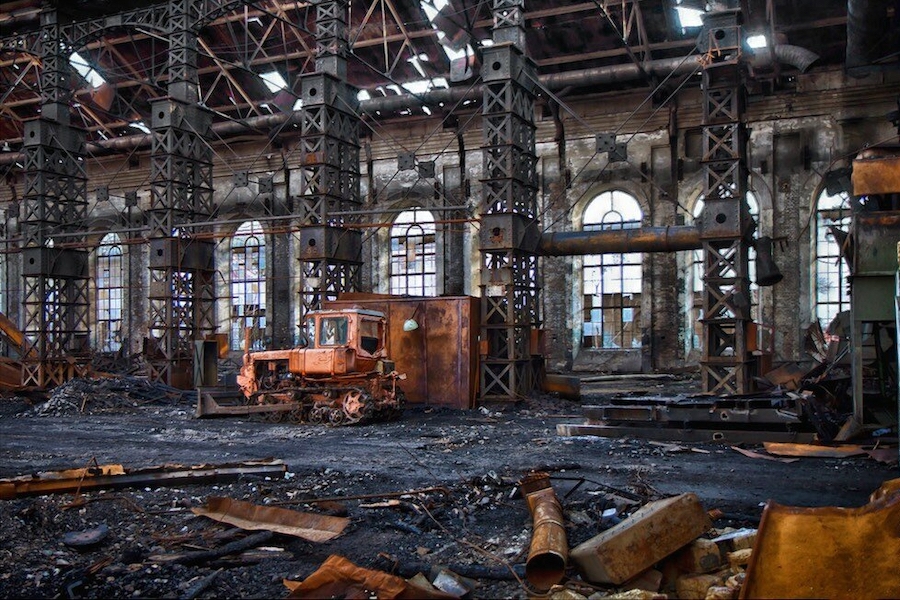
The Cost of Privatization
In 1762, Jean Jacques Rousseau wrote in his treatise The Social Contract, “The first person who, having enclosed a plot of land, took it into his head to say this is mine and found people simple enough to believe him was the true founder of civil society. What crimes, wars, murders, what miseries and horrors would the human race have been spared, had someone pulled up the stakes or filled in the ditch and cried out to his fellow men!” Today, more than two centuries after they were first penned, Rousseau’s words ring in the air of a privatized world. Faced with that world, looking to the states of the former Soviet Union can help us understand what privatization truly means for a nation — and why Rousseau opposed it.
Since the fall of the USSR, Ukraine has been the principle case study for Westerners looking to understand the realities of transitioning out of the communist world. Already in 1993, Central European University Press had published John Earle’s report: “The Privatization process in Russia, Ukraine, and the Baltic States.” As his paper reflects, it was widely believed that Ukraine would lead the post-communist world in “modernizing” its economic and political systems. Further, the assumption was that marketization would be a primary force in the democratization of Ukraine — an assumption largely founded in liberal philosophies which tie liberty to property.
John Earle in particular argued in his report that the privatization process would undermine party elites, as the leveling of economic power would surely topple their state-sponsored oligarchy. Though the sheer magnitude of corruption in Ukraine was recognized at the time, it was overlooked in favor of this narrative — that privatization was liberaliziation. Even after then-president Kuchma allegedly ordered the killing of Georgiy Gongadze, an anti-establishment reporter who was covering corruption during privatization, the West largely ignored the incident and remained focused on questions like “Does privatization raise productivity?”
In spite of the slew of pro-Western and globalist perspectives on privatization, contemporary research did achieve some scholarship on its harms. In 1995, The National Council for Soviet and East European Research put together a report cynically titled, “PRIVATIZATION AND CRIME: THE POST-SOVIET EXPERIENCE.” The report summarized: “The old bureaucrats dominate much of the privatization process, for example, often deciding who gets what at what price. Whereas the Party elite only enjoyed control of the state’s resources, they can now appropriate the state’s property.”
This story, of privatization used to simply subvert state resources and enrich individual elites, was ubiquitous throughout Ukraine. However, in spite of Ukraine’s long-running and deep ties to Russia, this privatization process was used to pad the wallets of oligarchs worldwide. The same report later notes, “Ukrainian oil reserves were embezzled and sold at market prices. Most of this money was not returned to the former USSR but placed on deposit in foreign bank accounts.” Just one year after this report was published, its warnings read as prophetic. Radio Free Europe reported in May of 1996 that Ukraine’s largest auto plant was set to be privatized. This example is especially poignant, as even its legal framework was built to the benefit of existing elites: “41 percent of the shares will be offered to Ukrainian investment companies and joint ventures; 12 percent will be offered to foreign buyers; and, Ukrainian citizens will be able to purchase five percent of the plant with privatization vouchers.”
This was the largest auto plant in the country. It produced 60,000 vehicles every year and employed thousands. And yet, citizens were only allowed 5 percent ownership. As comforting as Earle’s supposition may have been, the evidence pointed to privatization by the oligarch and for the oligarch. Far from the first step to liberal democracy, it merely entrenched and expanded the power of existing elites. It should be no surprise that both former President Petro Poroshenko and former President Viktor Yanukovych were captains of industry well before they became politicians.
Privatization in Ukraine resulted not only in small-scale corruption and inefficiency, but systemic stratification in the economy itself. In 2012, the European Sociological Review published an article tellingly titled, “New Inequalities Through Privatization and Marketization? An Analysis of Labour Market Entry of Higher Education Graduates in Poland and Ukraine,” which suggests Ukraine’s privatization of tertiary education especially stratified the population and stifled the economy, resulting in low university attendance among blue-collar students. Further, the study noted, “the share of graduates from private HEI quadrupled in Ukraine from 2.8 percent in 2001– 2003 to 12.8 percent in 2004–2006. Whereas privatization is already widespread in Poland at the beginning of the millennium (17 percent in 2001–2003), marketization is a more predominant phenomenon in Ukraine, where 38.8 percent of graduates paid fees at public universities during the period 2004–2006.”
What this shows is that the privatization of Ukrainian universities directly contributed to class divides in education. The formation of private universities split the population between those who could afford tuition and those left with decaying public universities as their only option. This divide left Ukraine less prepared than its neighbors for an increasingly service-based global economy, as fewer and fewer Ukrainians received quality higher education.
It should come as no surprise, then, that in March of 2012 the Carnegie Institute published an article outlining Ukraine’s lackluster growth after the Soviet Era. The article was titled, “The Underachiever: Ukraine’s Economy Since 1991.” However, this piece also highlights the flaws in the Western understanding of privatization’s real effects. Rather than centering the causes of Ukraine’s civil and economic stagnation around its relatively rapid privatization, Sutela argues, “As nation-building came to dominate the first years following Ukraine’s independence, politics were in continued turmoil and centered around jockeying for power. Economics therefore suffered.” Here we see political “turmoil” named as the cause of economic decline — a conclusion that both fails to account for the effect privatization had in catalyzing and entrenching those political disputes and willfully ignores how privatization caused much of that stagnation and decline.
So it is clear that privatization in Ukraine did little to provide the freedom and liberalization that Western neoliberals had promised. Instead, it merely entrenched the power of a few elites, and stratified and already desperate people. Though that reality confounded Western predictions and liberal hopes, to Rousseau, the evils of property have always been, and will always remain the natural conclusion.

